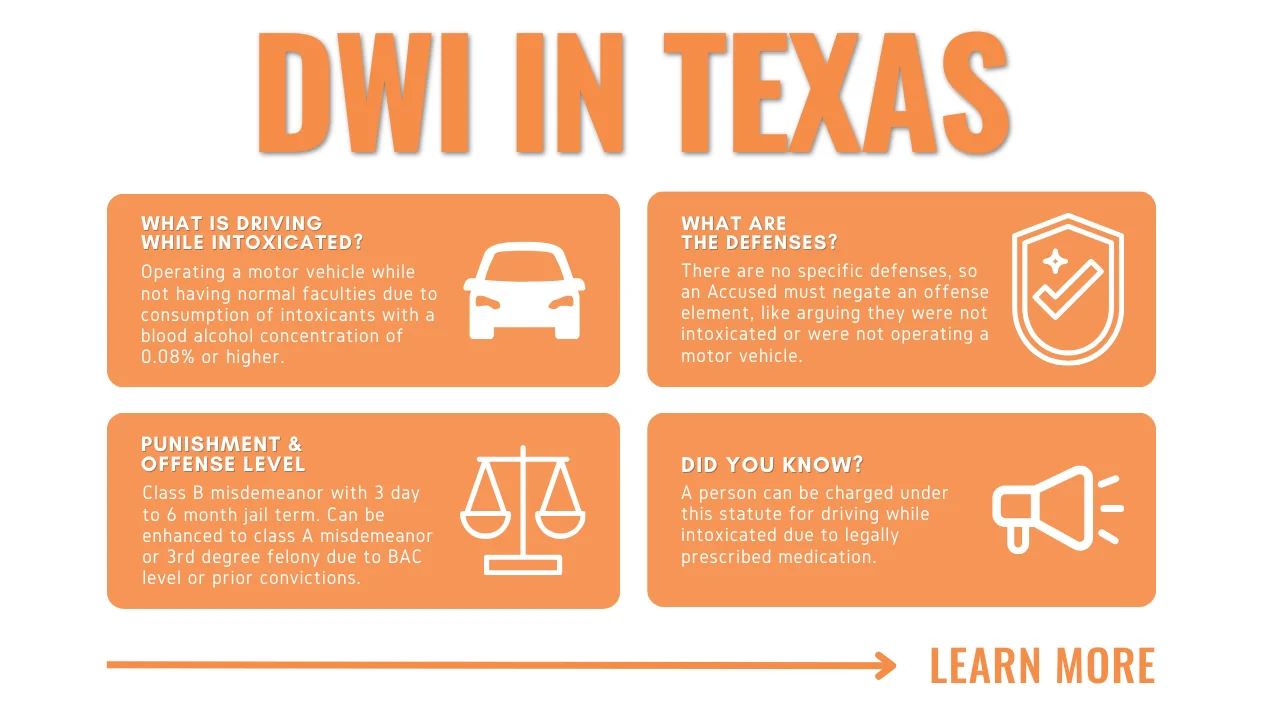WHAT IS DEFERRED ADJUDICATION FOR DWI IN TEXAS?
Deferred Adjudication is when a person enters a plea of guilty or no contest, and is placed on probation without a conviction under an agreement to dismiss the charge if probation is successfully completed. Read a more detailed article about Texas Deferred Adjudication laws and details here.
- What are the Benefits of Deferred Adjudication? The main benefit of Deferred Adjudication is avoidance of a criminal conviction. Criminal conviction, especially for drug and alcohol crimes, can have devastating impacts on college admissions, job opportunities, and security clearances.
- What are the Drawbacks of Deferred Adjudication? The two main drawbacks of Deferred Adjudication are the probation requirement and the inability to delete the charge through expunction. Charges that were dismissed after Deferred Adjudication stay on the record forever.
HOW DOES DWI DEFERRED ADJUDICATION WORK IN TEXAS?
Deferred Adjudication works by putting off an ultimate determination of guilt until probation is completed. DWI Deferred Adjudication gives a person a chance for a dismissal instead of a permanent conviction.
- Do you plead guilty for Deferred Adjudication in Texas? Yes – you must plead guilty or no contest for Texas Deferred Adjudication. A no contest plea has the same legal implication as a guilty plea. The plea is held over your head during probation to be used against you if you violate the terms and conditions.
- Does Deferred Adjudication mean conviction? No – Deferred Adjudication means the final decision in the case is being put off to a later time after probation. If probation is successfully completed the charge is dismissed.
WHAT IS THE DWI DEFERRED ADJUDICATION LAW IN TEXAS?
The legal definition for Deferred Adjudication in the Texas Code of Criminal Procedure Chapter 42A, Subchapter C is:
Art. 42A.101. PLACEMENT ON DEFERRED ADJUDICATION COMMUNITY SUPERVISION: (a) Except as provided by Article 42A.102(b), if in the judge’s opinion the best interest of society and the defendant will be served, the judge may, after receiving a plea of guilty or nolo contendere, hearing the evidence, and finding that it substantiates the defendant’s guilt, defer further proceedings without entering an adjudication of guilt and place the defendant on deferred adjudication community supervision.
WHAT DOES DEFERRED ADJUDICATION MEAN FOR A DWI IN TEXAS?
Deferred Adjudication is a guaranteed agreement for a DWI dismissal in Texas. Defer means to put off. Texas judges put off the decision of guilt or innocence when granting deferred adjudication. DWI Deferred is powerful, and is sometimes – but not all the time – the best result when facing a DWI charge. There are other ways to beat a DWI in Texas.
- Does Texas offer Deferred Adjudication for DWI? Yes, Texas law allows Deferred Adjudication for DWI. Deferred Adjudication is not automatic, however. There are numerous disqualifying factors, prosecutors get a chance to weigh in, and ultimately Texas judges have total discretion to grant, deny, and revoke Deferred Adjudication.
- What is the Second Chance Law for DWI in Texas? The DWI Second Chance law allows individuals to seal their DWI conviction through a Nondisclosure two years after successfully completing a probation that included ignition interlock as a requirement. Read more about sealing Texas DWI charges here.
CAN YOU GET DEFERRED FOR DWI IN TEXAS?
Yes – you can get Deferred Adjudication for DWI in Texas. Deferred Adjudication is only available for Class B misdemeanor DWI charges. Aggravated DUI charges like DWI 0.15+, DWI 2nd, DWI 3rd, and DWI with Child do not qualify for Deferred Adjudication.
- What do you need for a Texas DWI Deferred Adjudication? There are 4 requirements needed to apply for DWI Deferred Adjudication in Texas:
1 – No prior DWI convictions
2 – No prior Deferred Adjudication terms
3 – No evidence of blood alcohol content 0.15 or higher
4 – No collision, accident, or injury
- Who is eligible for Deferred Adjudication for DWI? Defendants with no prior DWI convictions, who have not previously received Deferred Adjudication (for anything), are eligible as long as their blood alcohol content was not a 0.15 or higher and the incident did not involve an accident or a collision.
- How much does Deferred Adjudication cost in Texas? Deferred Adjudication in Texas is expensive – thousands of dollars at minimum. Though costs vary widely across counties, court costs, fines, classes, and alcohol monitoring devices make up the bulk of the cost of DWI Deferred Adjudication in Texas. Read more about Texas DWI costs here.
CAN YOU GET DEFERRED FOR DUI IN TEXAS?
Yes – you can get Deferred Disposition for DUI in Texas. In Texas, DUI is only applicable to minors under 21 years old. Deferred Disposition is an excellent result, as it guarantees expunction eligibility at a later date.
REQUIREMENTS FOR TEXAS DWI DEFERRED ADJUDICATION
Probation is required for Deferred Adjudication. The term is negotiable, and determined by the judge. There is no minimum term. The maximum term is 24 months. Though discretionary, Community Supervision typically requires completion of classes, participation in drug and alcohol screenings, and community service. Drug testing, reporting, and the installation of an Ignition Interlock Device (IID) are also mandatory.
WHAT ARE THE DWI DEFERRED ADJUDICATION TERMS AND CONDITIONS IN TEXAS?
There are no legally required terms and conditions for DWI Deferred Adjudication in Texas. The requirements vary across Texas counties, and variations exist within a county from judge to judge.
- How long is Deferred Adjudication for DWI in Texas? There is no legal requirement for how long Deferred Adjudication must last. Also, early termination is available for defendants participating in DWI Deferred Adjudication probation.
- Can I get off probation early for DWI in Texas? Yes – you can get early release from DWI probation if you received Deferred Adjudication. However, if you were convicted and sentenced to probation you cannot get early release.
WHAT HAPPENS IF YOU VIOLATE DWI DEFERRED ADJUDICATION TERMS?
Probation violations are very serious and can have devastating consequences. Defendants on Deferred Adjudication probation are, by law, subject to the full range of punishment upon revocation. This means that a judge can apply the maximum punishment for the simplest violation.
- Is Deferred Adjudication probation in Texas? Yes, Deferred Adjudication is a special form of probation in Texas. Unlike Deferred Disposition, Deferred Adjudication requires registering with and being monitored by a county community supervision or probation officer.
- Does Deferred Adjudication count as a conviction in Texas? Deferred Adjudication counts as a conviction if you violate the terms and a judge orders revocation. Also, DWI charges dismissed through Deferred Adjudication count as a conviction for all subsequent charges at any later date.
HOW DOES DEFERRED ADJUDICATION AFFECT YOUR CRIMINAL RECORD?
Deferred Adjudication becomes a permanent part of the criminal record in Texas, and can never be expunged. Additionally, DWI charges dismissed through Deferred Adjudication can be used at any later date to enhance a subsequent DWI charge.
- How long does Deferred Adjudication stay on your record in Texas? Yes. DWI charges resolved through Deferred Adjudication stay on the record forever. In certain cases the charge can be sealed after dismissal, through a separate legal procedure called a nondisclosure, but there is no time period after which they “fall off” the record.
- How do I remove a Deferred Adjudication from my record? DWI charges cannot be removed from the record after Deferred Adjudication. In limited cases they may be sealed through an order of nondisclosure. Read an in-depth article about sealing DWI’s in Texas.
- Does DWI Deferred Adjudication Show up on a background check in Texas? Yes, DWI charges resolved through Deferred Adjudication show up on background checks. Read more about DUI and background checks.
CAN DWI DEFERRED ADJUDICATION BE EXPUNGED IN TEXAS?
No – DWI charges dismissed through Deferred Adjudication can never be expunged under Texas law.
- Can Deferred Adjudication be used against you? Yes, it is common for charges that were deferred to have negative consequences when applying for college, jobs, and the military.
KEY TAKEAWAYS
- DWI Deferred Adjudication in Texas offers an alternative to a permanent criminal conviction, allowing eligible defendants to avoid the long-term negative effects of a DWI record.
- Retaining a skilled Texas DWI lawyer gives you the best chance to get DWI Deferred Adjudication.
- Compliance with and successful completion of court-imposed conditions is critical, and in some cases, can provide a pathway to having the record sealed through nondisclosure.
- It is possible to early terminate DWI Deferred Adjudication terms in Texas through early release.
- Non-Compliance with the terms and conditions of the DWI Deferred Adjudication agreement can lead to severe legal consequences including a motion to revoke probation, jail time, and the severe consequences of Texas DWI penalties.



















